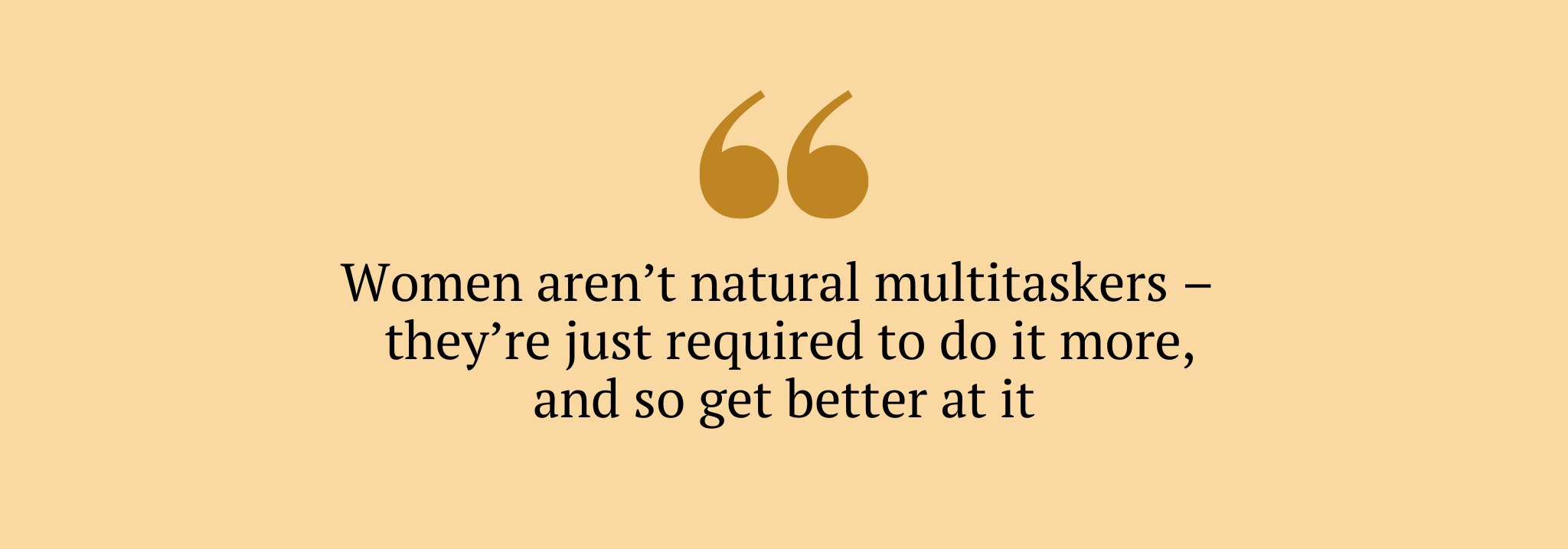It’s a perplexing predicament: the more accomplished you become at juggling responsibilities, the more that seem to accumulate on your plate. Here, we’re putting a spotlight on the mounting pressures of ‘multi-thinking’, and how we can step away from the cycle
You’re making a mental list of what you need to get done at work, while thinking about what’s in the fridge for dinner. You remember the wet washing is still in the machine, and you’ve got to pay the nursery fees before you inevitably forget. You’ll have to swing by the shops on your way home to pick up a new bulb to replace the porch light that’s out as well, and don’t forget it’s your friend’s birthday tomorrow, so make sure you message them in the morning.
On their own, these might sound like small tasks, but they can quickly accumulate into an overwhelming list. And studies, including a 2023 review paper published in the journal Sex Roles, show that women – especially those in heterosexual relationships – perform the larger proportion of mental labour in relationships, especially when it comes to childcare and parenting decisions.
Even in couples that aim to split their responsibilities equally, the invisible labour involved in managing a household and family – beyond the practical chores like cooking and cleaning – typically falls on women’s shoulders. It’s not just about the doing, but also the remembering, anticipating, planning, and overseeing that means life can carry on smoothly.
And to cope with this cognitive load, many women find themselves ‘multi-thinking’ – contemplating lots of different things at the same time – which leaves them stressed, overwhelmed, and at risk of burnout.
Why women multi-think
Juggling everything from work to hobbies, childcare, and household responsibilities, creates a constant need for multi-thinking and multitasking for women, says therapist Jenny Warwick. But, she adds, this gender disparity is rooted in societal expectations and historical gender roles.
“Women are often painted as being good at multitasking, as if this is an achievement or that it is simply a natural part of being a woman,” Jenny says. “Stereotypes about women’s innate ability to plan, organise, and multitask result from socialisation. Girls grow up observing and internalising these expectations, and these stereotypes contribute to the perception that women are naturally better at multitasking.”

However, research, such as a study in PLOS ONE, shows this simply isn’t true. Women aren’t natural multitaskers – they’re just required to do it more, and so get better at it. In reality, multitasking is almost always a misnomer, as our brains lack the architecture to perform multiple tasks successfully at the same time, as noted in a 2019 paper in Cerebrum, so really we’re just overloading ourselves by jumping between tasks constantly.
Entrenched beliefs about women’s roles also contribute to multi-thinking. Despite most families having dual incomes, the home is still seen as the woman’s domain, so the running of the household typically falls on them in heterosexual relationships. And, significantly, studies, including 2021 research in Community, Work & Family, show that women internalise the expectations they encounter due to their gender, which results in them doing more than their share of unpaid labour at home. Additionally, motherhood ideals – including the concept of the perfect mother who thinks of everything – mean that women take on childcare tasks that could be easily shared.
There are structural factors at play, too. It’s often mothers who take on flexible work or reduce their working hours so they can fit work around childcare, rather than fathers. Although all UK workers have the right to request flexible working arrangements, a 2021 study published in Work, Employment and Society notes that almost one-third of fathers believe that flexible working arrangements are unavailable to them. This means women are more available for childcare and household work, and inevitably end up thinking about it more.
Consequently, Jenny says, women end up with a heavy mental load. “Women and girls are socialised to fulfil multiple roles simultaneously – the wife, the mother, and the CEO,” she explains.
Multi-thinking, stress, and burnout
The problem with multi-thinking is that it can easily spill into cognitive overload. According to 2021 research, published in Community, Work & Family, the mental work involved in scheduling, planning, and organising a household becomes a mental load when there’s an emotional element attached, like worry or stress. So if the task is to remember a child’s non-uniform day, and forgetting means they’ll be upset or ridiculed at school, it invariably contains an element of anxiety.
This heavy mental load can easily lead to overwhelm, affecting women’s mental health, relationships, and careers. “Trying to keep so many plates in the air at once leads to stress and mental exhaustion,” says Jenny. “Something has to give – and, unfortunately, this is likely our mental wellbeing due to being constantly overloaded. It is the perfect ingredient for burnout.”
How to stop multi-thinking leading you down a path to burnout
The systemic issues underpinning multi-thinking make it a difficult problem to solve. On a societal level, we need to dismantle long-standing beliefs about gender roles that are preventing equality, and widening the gender pay gap. Instead of expecting mothers to juggle work and childcare, normalising stay-at-home fathers and flexible work for men would help to remove stereotypes about ‘breadwinners’, and who should be at home.

For individuals, quantifying and communicating how much time we spend organising household tasks and childcare – and how this is shared with your partner – will help lay the groundwork for change. If we’re outspoken about how much effort is involved, it’s more difficult for others to ignore.
“Communicate openly with partners and family about the distribution of responsibilities to avoid feeling overwhelmed,” says Jenny.
Claire Elmes, a therapist and stress coach, says it’s also important to notice when your mind is racing. “Log what these thoughts are, and any positive and negative self-talk that accompanies them,” she says, as the unrealistic expectations faced by women mean they’re set up to feel like they’ve failed.
And when things feel overwhelming, find a way to ground yourself. “Whether it is yoga, mindfulness, or breathwork, find a way to quieten the mind and body,” says Claire. “It switches us from our sympathetic nervous system – the fight-and-flight mode triggered by stress – to our parasympathetic nervous system, which allows us to rest and recover.”
Finally, another way to stop multi-thinking is to simply do less. Set clear boundaries, learn to delegate, and say no when your to-do list is too long. It may feel uncomfortable, as we tend to internalise the expectation to do everything, but it’s an important way to enact change. As Claire emphasises: “We need to understand that we cannot do everything, and that’s OK.”


Comments